
In the early hours of Friday, five Iranians convicted of drug-related offenses were hanged at Urmia Central Prison, northwest of Iran, as authorities have significantly accelerated executions.
Hengaw Human Rights Organization, a Kurdish rights group, says the executed prisoners were identified as Parvin Mousavi, 50; Mansour Naseri, 45; Parviz Ghasemi, 35; Yousef Saeidi Chehreh, 32; and Ramin Lavandi, 27.
The prisoners had been jailed for four to five years, separately accused of involvement in drug trafficking.
Parvin Mousavi, who developed cancer while imprisoned, was the ninth woman executed in Iranian prisons since the start of the year amid a rising wave of execution.
The execution day was marked by protests from fellow prisoners during Mousavi’s transfer to solitary confinement, leading to altercations with prison guards.
Sareh Sedighi Hamedani, a former fellow inmate, spoke to Voice of America, asserting Mousavi’s innocence and questioning the fairness of the trial that saw a co-defendant acquitted despite a criminal record.
Amnesty International has highlighted a significant uptick in executions related to drug offenses in its latest report, stating that over half of the 853 death sentences issued in Iran in 2023 were for drug-related crimes. This marks a return to stringent anti-drug measures, a contrast to the relatively lower rates of execution for such offenses recorded between 2018 and 2020.
The organization’s report titled “Don’t Let Them Kill Us” calls for urgent international intervention to halt the surge in executions, which it describes as transforming Iranian prisons into grounds for mass executions. The report also warns against the disproportionately impact of such policies on impoverished and marginalized communities, urging a reconsideration of the approach to drug-related offenses.
In his November 2023 address to the United Nations General Assembly, UN Secretary-General Antonio Guterres highlighted the “alarming” rise in executions in Iran. The concern was widely shared both within and outside Iran, prompting calls for the Iranian government to halt the “state killings,” and sparking numerous global protests.
In February, Iran’s Supreme Leader Ali Khamenei responded to the global condemnation by minimizing it as “some noise,” and categorizing the executed individuals as “criminals.” He further exploited the Gaza war between Israel and Hamas to criticize Western reactions. “Those in the West who protest the execution of a criminal turn a blind eye to the killing of 30,000 people in Gaza,” he stated.
This post was originally published on this site be sure to check out more of their content.







